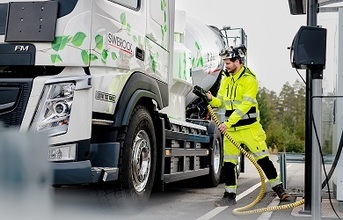
Next year, hauliers in Europe will be able to order all-electric versions of Volvo's heavy-duty trucks. This means that Volvo Trucks will offer a complete heavy-duty range with electric drivelines starting in Europe in 2021.
Volvo Trucks is now running tests of the electric heavy-duty Volvo FH, Volvo FM and Volvo FMX trucks, which will be used for regional transport and urban construction operations in Europe. These trucks will have a gross combination weight of up to 44 tonnes. Depending on the battery configuration the range could be up to 300 km. Sales will begin next year and volume production will start in 2022. This means that from 2021 onwards Volvo Trucks will sell a complete range of battery-electric trucks in Europe for distribution, refuse, regional transport and urban construction operations.
"By rapidly increasing the number of heavy-duty electric trucks, we want to help our customers and transport buyers to achieve their ambitious sustainability goals. We're determined to continue driving our industry towards a sustainable future," says Roger Alm, President Volvo Trucks.
Volvo Trucks started manufacturing the Volvo FL Electric and Volvo FE Electric in 2019. These are electric trucks intended for city distribution and refuse operations, primarily in Europe. In North America, sales of the Volvo VNR Electric, a truck for regional transport, will start on December 3, 2020.
"To reduce the impact of transport on the climate, we need to make a swift transition from fossil fuels to alternatives such as electricity. But the conditions for making this shift, and consequently the pace of the transition, vary dramatically across different hauliers and markets, depending on many variables such as financial incentives, access to charging infrastructure and type of transport operations," explains Roger Alm.
END


























